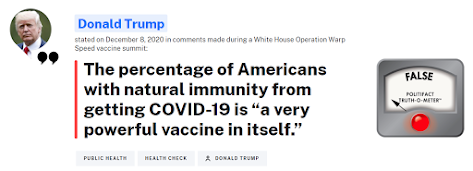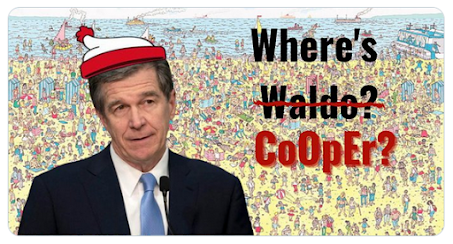PolitiFact truly never ceases to amaze us with its forays into free interpretation of political claims. Perhaps President Trump deserves some of the credit for driving PolitiFact mad via Trump Derangement Syndrome.
Would you believe that Mr. Trump believes that immunity acquired through recovery from the coronavirus counts as a "vaccine"?
That's where PolitiFact went on Dec. 15, 2020:
This analysis will take some doing, because PolitiFact's fact check contains multiple layers of fact check lunacy.
First, we need to see what Trump actually said. PolitiFact covers that adequately in the fact check:
"You develop immunity over a period of time, and I hear we’re close to 15%. I’m hearing that, and that is terrific. That’s a very powerful vaccine in itself," said Trump, who was responding to a reporter’s question about what his message to the American people was as the holidays approach and levels of COVID cases in the U.S. continue to rise.
Immediately after, the fact check runs off the rails at about a 90 degree angle:
It wasn’t the first time Trump had given credence to the idea that if enough people in a population gain immunity to a disease by being exposed to it, the illness won’t be able to spread through the remainder of the population — a concept known as "herd immunity."
Assuming PolitiFact and fact checker Victoria Knight did not seek to deliberately mislead their readers, this looks like a likely case of confirmation bias. Knight and PolitiFact were looking for Trump to say something false and interpreted Trump's claim to create the falsehood they sought. Otherwise, it's a mystery how anyone could interpret Trump's claim as they did.
First, Trump is pretty obviously talking about natural immunity as a metaphorical vaccination. Natural immunity is not entirely unlike immunity acquired via a human-devised vaccination. We would hope that even liberal bloggers working as non-partisan fact-checking journalists would know about figures of speech such as metaphors.
Second, why take the 15 percent plateau as the notion Trump was comparing to a vaccine instead of the concept of naturally acquired immunity? We can't imagine a reason apart from either confirmation bias or premeditated deceit. Naturally acquired immunity has approximately the same role in achieving herd immunity as a vaccine. Both confer immunity, and both would contribute toward a population's potential for herd immunity. If that was Trump's point, as seems to reasonably be the case, he's right.
How does a mainstream fact checker get so far off course so quickly? And why isn't everybody blowing the whistle on this kind of fact-check shenanigan?
As for PolitiFact, it keeps chugging along on one of the sharpest tangents ever devised:
However, experts have warned that attempting to achieve herd immunity naturally, by allowing people to get sick with COVID-19, could result in more than a million deaths and potentially long-term health problems for many. A better way to achieve protection across the population, experts say, is through widespread vaccination.
Why do Knight and PolitiFact think this paragraph has any relevant relationship to Trump's claim? Do they suppose Trump calling natural immunity a "powerful vaccine in itself" represents an intent to change policy to forgo the use of man-made vaccines and seek to combat the virus with natural immunity alone?
This is fact-checking gone insane. The paragraph doesn't belong. PolitiFact could have talked about the role natural immunity plays in achieving herd immunity. Readers could benefit from that explanation. But they get hardly any of that explanation from PolitiFact. Instead, they get railroaded down PolitiFact's branching tree of tangent:
So, we thought it was important to check whether 15% is anywhere close to the herd immunity threshold, and whether this level of natural immunity could be considered "as powerful as a vaccine."
So PolitiFact fact checks whether Trump is right that 15 percent natural immunity could confer herd immunity, even though that really has nothing to do with what Trump said. And where does that "as powerful as a vaccine" line come from? PolitiFact puts it within quotation marks, as though it is quoting Mr. Trump. Is it supposed to be something Trump said?
It's not in the transcript of Trump's remarks that PolitiFact linked. And our Google search using "Trump" AND "as powerful as a vaccine" did nothing to encourage us to believe the quotation came from Trump.
Remember, a team of editors supposedly reviews each PolitiFact fact check. Apparently each of them gave some sort of okay to this dumpster fire of a fact check.
The PolitiFact team overlooked an obvious use of metaphor and then went circus clown on a balloon to turn Trump's claim into something it wanted to fact check.

















